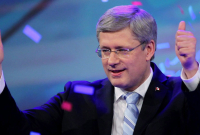Support strong Canadian climate journalism for 2025
They’ve done it again.
In a stunning and ultimately bizarre move, the Globe & Mail newspaper and Google Canada, sponsors of a leaders’ debate on the economy prior to the federal election, have cut Elizabeth May, leader of the Green Party of Canada (GPC), off the roster.
The Munk Debates organization, which bills itself as “the world’s preeminent public debating forum” has similarly rejected the idea of Elizabeth May debating the leaders of the three major parties on foreign policy. She will be participating in other events, including one debate hosted by Maclean's, but won't be on those two high-profile debates.

Citing the need for a “focused debate,” Sean Humphrey, the Globe & Mail’s vice-president of marketing, defended the newspaper’s action. Such an argument – about as simplistic as the Conservatives’ approach to cost cutting (chop five per cent off everybody’s budget, regardless of importance) – betrays an astonishingly willful ignorance of Canada’s political realities.
The chairman of Munk Debates, Rudyard Griffiths, said back in May that inviting all six parties with MPs "would unduly limit our ability to hold a substantive debate." Now he says he “really struggled" with this decision.
But are all the parties in the House of Commons equal – or representative – when it comes to discussing Canada as a whole?
Both debate sponsors have arbitrarily excluded the GPC, the BQ and Canada's sixth federal party on purely numerical grounds; the Green Party of Canada, and the two parties rooted solely in Québec politics, have been excluded because they all have only a pair of sitting MPs each.
But Elizabeth May and the GPC, unlike their colleagues from Québec, have been a prominent and at times seminal presence in many national debates and discussions in the House of Commons since the day the Green Party leader walked in the door.
The GPC was formed in 1983, and has fielded candidates in most Canadian ridings in the last several elections. It received approximately 1,000,000 Canadian votes in the 2008 election, and did not elect more members only because the current “First-Past-the-Post” electoral system punishes parties who contend with their more regionally established competitors. (The Bloc Québecois, for example, earned just over 1 million votes in the 2008 election, but elected over 40 candidates – simply because its support is concentrated narrowly in Québec.)
And by the way, how many readers know that officially there are indeed six federal political parties?
That’s right, six.
Canada’s sixth and virtually unknown party, Forces et Démocratie, has two sitting members, both of whom are disaffected former members of other parties.
The party (called Strength in Democracy in English) was just formed on October 21, 2014 by two Québec MPs: Jean-François Fortin, who quit the Bloc Québecois last August because he was uncomfortable with BQ leader Mario Beaulieu, and Jean-François Larose, who quit the federal NDP on the day their party was formed.
Their only goal is to better represent their own riding constituents – so far, only in Québec. The party has a solitary candidate outside of Quebec in the upcoming federal election: Toban Leckie, in Peterborough—Kawartha, is a 30-year-old student at Trent University in Canadian and Indigenous Studies.

Far from having a national perspective, Canada’s other federal political party, the Bloc Québecois, was formed in 1991 simply for “the protection of Quebec's interests in the House of Commons, and the promotion of Quebec sovereignty.” Its interests outside “la belle province” are minimal.
Excluding Elizabeth May from political leaders’ debates (there will be other debates during the upcoming election campaign, by the way, in which she will be included) appears to be a petty and addictive habit among some major media players in Canada.
The Green Party, despite running candidates in all 308 Canadian ridings, was excluded from the leadership debate in the 2004 election. In 2006, after May had been elected leader that August, she was excluded from the leadership debate for the first time. In 2008, an attempt was made once again to exclude her from TV debates for the same reason, but the decision was reversed because of massive public protest.
She was deemed by many to have won that debate.
In 2011, the Green Party leader was once again excluded from televised debates, while the Bloc Québecois, despite the fact that its members derive solely from Québec, was allowed to participate.
This time around, her exclusion is utterly groundless. There are now two elected GPC MPs, the party is again fielding candidates from coast to coast to coast, and the role of the Green party in Commons debate and discussion over the last four years has been prominent and meaningful.
With her many years of non-partisan political experience, her legal training and her incisive mind, May has been a force to reckon with in parliamentary debate – so much so that Stephen Harper has resorted to various tactics to try and limit her ability to participate in Commons committees.

And in the four years since she was elected in Sidney, BC, Elizabeth May has been no ordinary MP in other ways.
In 2012, she was voted by her colleagues in the House of Commons as Parliamentarian of the Year.
In 2013 she was voted Hardest Working MP.
In 2014 she was voted Best Orator.
She became, in 2005, an Officer of the Order of Canada.
May’s leadership was potent enough to convince Bruce Hyer, an independent MP who had previously been part of the NDP caucus, to join her as the second elected GPC representative in the Commons in December, 2013.
His departure from the NDP had been forced upon him when he, as a matter of conscience, had voted against NDP support of the long gun registry, in accord with the wishes of his largely rural constituency. He has a strong background in environmental science, and while with the NDP, introduced a number of measures around environmental issues, including having his very first private members bill, Bill C-311, the Climate Change Accountability Act, passed despite resistance from the minority Conservative government.
If the folks at the Globe & Mail, Google Canada and the Munk Debates don’t reverse their decision – at the very least to include Elizabeth May in these debates, with or without the two other leaders, whose claims to national engagement and accomplishments are far more tenuous – then they will be acting very much like the current federal government.
They will, like Stephen Harper, demonstrate that, in the words of Oscar Wilde, they know the price of everything, but the value of nothing.




Comments